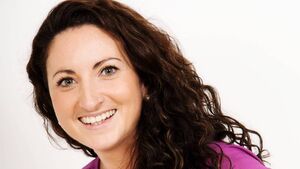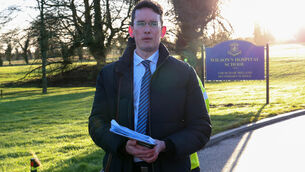'I've learned that grief and joy can co-exist'

Niamh McCann: Grief is always there, but you learn to carry it.
Niamh McCann is intent on living life to the fullest. But you would most definitely forgive her if that wasn’t her default position. Niamh and her family have been through some unimaginably difficult times. She lost her father when she was just 12 years old and her beloved son CJ at just 21 months old in 2023.
The Westmeath native, now living in Ballaghaderreen, has worked as a sports journalist and in GAA headquarters in Croke Park and is now studying for a Masters in Guidance Counselling.
We sat down to chat about her story and how she has used immense loss to shape her outlook on life.
Niamh, thank you for talking to me. Tell me a little about yourself.
I'm from the Westmeath-Longford border, a place called Tang. Even though it’s in Westmeath, a lot of people think I’m from Longford because I went to school in Ballymahon, I teach in Ballymahon, and I played all my sport in Longford. And my dad was from Offaly, so I grew up very, very confused as to where I was actually from!
Offaly were actually very good at hurling at the time, so I definitely followed that. I grew up in a sports-mad household. My dad played hurling and football for a club called Belmont. He was still playing with them right up until he passed away at 37 from a heart attack. He died suddenly, at home. I was 12. That was probably one of the biggest events in my childhood.
That must have had a huge impact on you Niamh.
Dad was the eldest of his siblings. His parents died within nine months of each other from heart attacks when he was 21. He had three younger siblings, so he grew up kind of taking on a parental role. I think seeing all of that growing up made me really aware that life is short, that age doesn’t determine when you leave this world. I know that sounds very heavy, but even as a teenager, I was very aware of it.
To be honest, for years, I used to think I wouldn’t live past 37. People always told me I was very like my dad, and when you hear that over and over, you start to think, 'Well, if I’m so like him, maybe I’ll only live as long as he did'. I lived like that for years, but I remember turning 35, and by then I had the two girls, Roisin and Clodagh, and thinking, 'Actually, I’m not ready to go yet'. Before that, I’d almost accepted the idea, but at that point, it scared me.
A counsellor once asked me to describe my childhood, and I said, 'I had a really happy childhood. My dad passed away when I was 12.' She stopped me and said, 'You just glossed over that.' But it’s true. I had a really happy childhood. A very sad thing happened, but it didn’t take away from the happiness I had before and after. I think that’s part of why we had the hashtag for CJ’s fundraising—#ChaseJoy. Because even though we’ve been through so much as a family, we’ve always focused on finding joy in life. Life is precious, and you have to live it.
That’s such a powerful outlook, but it must have shaped a lot of the decisions you’ve made since?
Absolutely. I’m actually in the University of Limerick (UL at the moment studying for a Master’s in Guidance Counselling, and we had to write about our career and life journey. It really made me realise that the earlier part of my education and career was all about emulating my dad. I picked accountancy for the Leaving Cert, which was not my subject at all, because Dad was an accountant. I went on to do journalism in college because I loved writing, but I told myself it was to do sports journalism because Dad loved sport. I was trying to make him proud, in a way, by following in his footsteps.
It wasn’t until I started to connect the dots that I realised I’ve always been drawn to people - their stories, their lives, how they think. In journalism, I loved interviewing people. That’s what fascinated me. And now, in guidance counselling, it’s the same thing - I love helping people and understanding them. It’s funny how life works. I wouldn’t change any of it, though. It’s all brought me to where I am now.
You worked in Croke Park too, which must have been an exciting experience.
I spent four and a half years working in Croke Park, starting in the press office. It was like a dream job, especially in the first two years. Honestly, it felt like going into Disneyland every day. I mean, walking those corridors, surrounded by all the history and seeing legends of the game - it was just phenomenal.
Initially, it was all about covering matches and events. I remember my first summer there, it was when Armagh and Tyrone played in the first-ever All-Ulster All-Ireland final. Such an historic moment, and I was right there, working on press releases, interviews, and event coverage. I’d already done a lot of work on how the Troubles had impacted the GAA during my studies, so being there for something so big felt really special.
Eventually you decided to move on?
I’m someone who regularly stops to ask, 'Am I happy? Am I doing what I want to be doing?' And at the point I did check in with myself, the answer was no. I took a career break from the GAA, and that decision ultimately set me on the path to teaching and guidance counselling, where I feel like I can make a real difference. But I wouldn’t trade those years in Croke Park for anything - it gave me incredible memories and experiences that shaped where I am today.
You mentioned CJ earlier. Would you feel comfortable sharing a bit about CJ’s story?
CJ was born in January 2022. He was our third child, after Roisin and Clodagh. We didn’t think we’d be able to have any more children after Clodagh because of complications during her birth. I had a uterine rupture with her and lost 3.6 litres of blood. My consultant told me afterwards she wasn’t sure she’d be able to save me. So when CJ came along, it felt like such a gift. He completed our family.
But four days after he was born, my brother, Sean, was diagnosed with a brain tumour. It was such a surreal time. Very suddenly, he was in Beaumont Hospital, preparing for surgery.
Sean went through treatment, and just as we were starting to feel like we could breathe again, CJ was diagnosed with ATRT, a rare and aggressive paediatric brain tumour, in November 2022. The odds were devastating - 5 to 10% survival. Joe and I decided from the start that we were going to live whatever time we had with CJ to the fullest. We knew we couldn’t control the outcome, but we could control how we spent the time we had.
CJ was incredible. Even when he was going through chemo, he’d fight to play, to laugh. There were days when he was so tired, but he’d still find the energy to engage with us. He taught us so much about resilience, about joy. I remember a nurse saying to me, 'Sometimes the cancer just gets bigger than the fighter'. That’s what happened. CJ fought so hard, but the tumour was just too aggressive. He passed away in my arms.
I can’t even imagine. How do you process something like that, or even begin to?
I think it’s something you never fully process. Grief is always there, but you learn to carry it. The hardest part is how it hits you in waves. Some days you’re fine, and then there are days when it’s just impossible to function. The week before CJ’s anniversary was the hardest. I couldn’t answer the phone, couldn’t talk to anyone. But I knew the week after would be easier. You have to fight through those moments.
One thing I’ve learned is that grief and joy can co-exist. Even in those moments of pain, you can find joy - a memory, a laugh, something to hold onto. CJ’s legacy has been a huge part of that. We’ve done fundraising in his name, and knowing that we’re helping other families has been incredibly healing. Joe’s cycle from Malin to Mizen raised over €260,000, which will go to helping other children and families facing similar battles. That’s CJ’s legacy - helping others.
You’ve spoken about life and death in such a profound way. How do you view it all now?
I think I’ve always been aware of how short and precious life is. Losing Dad so young, and then everything with Clodagh and CJ, has only reinforced that. I’ve seen how quickly life can change. My dad passed away on our sitting room floor after watching an Ireland v Portugal soccer match. CJ passed away in my arms. You don’t forget those moments. They’re seared into your memory.
But what I’ve also learned is that you can’t let fear of death stop you from living. Death is inevitable for all of us. It’s not something to dwell on, but it’s something to acknowledge. When you do, you realise how important it is to live the life you have. Not someone else’s life, not the life you think you’re supposed to have, but the one you have. That’s the lesson CJ taught me - to live fully, to find joy in every moment, even the hard ones.
That’s such a beautiful way to honour him. Do you have hopes for his legacy in the future?
I hope CJ’s story inspires people to live, to really live; not to just exist, but to appreciate the life they have. Life is messy, and hard, and beautiful, and short. I hope people remember that and make the most of it.
Through the fundraising, we’ve been able to make a difference for other families, and that’s something I want to continue. Joe said it best: 'This isn’t for CJ, it’s for other CJs.' Knowing that CJ’s life, as short as it was, has made an impact, that he’s helped others, gives us so much comfort.
You’re an incredible person, Niamh. Do you think there’s a reason you’ve been able to cope the way you have?
Honestly, I think it’s a combination of things. My mum and Joe have been huge sources of strength for me. Joe’s been my rock through all of this. It’s easy to love someone when everything’s good, but Joe has been there through the worst of it, holding me up. And I think we’re both shaped by our experiences.
I also think it comes down to how I view life. I’ve always been positive, almost annoyingly so, but that mindset has helped me. I don’t want to waste a moment. I’ve seen how precious life is, how quickly it can be taken away. That’s something you can’t unlearn. It changes you.
If sharing CJ’s story or my own can help someone else, then it’s worth it. Because at the end of the day, it’s about living - fully, deeply, joyfully - for however long we have.




